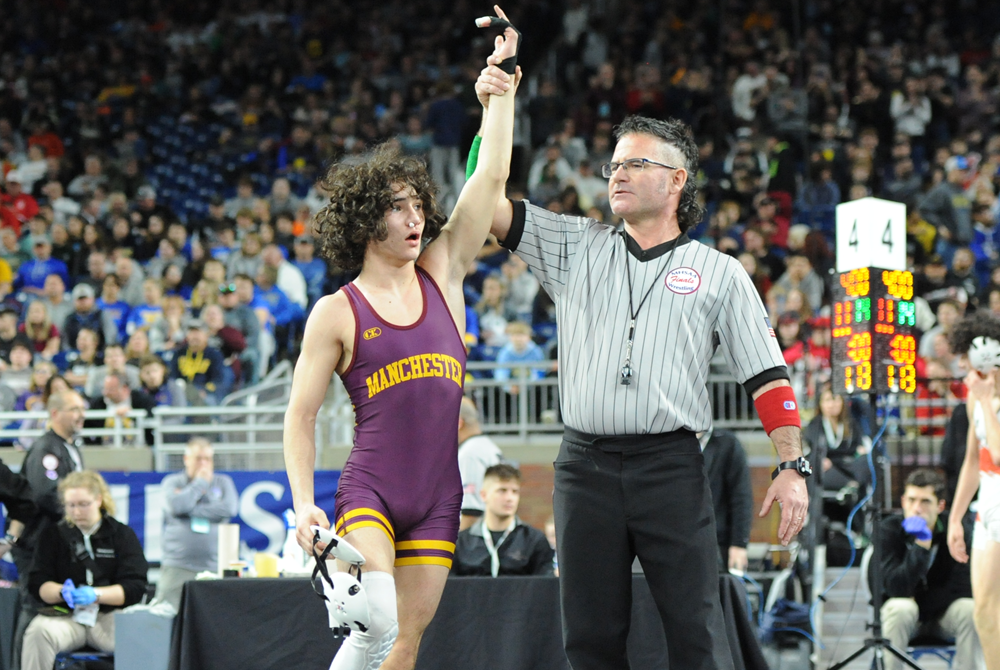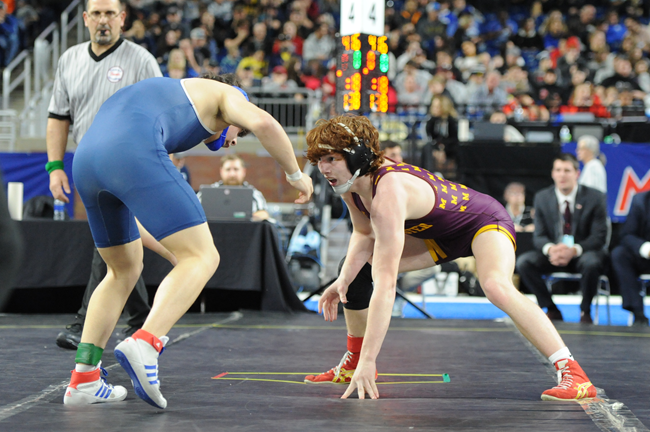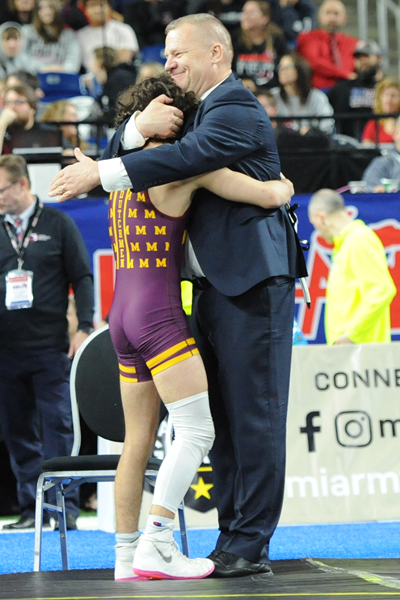
Task Force Building Multi-Sport Message
November 11, 2016
By Geoff Kimmerly
Second Half editor
Walled Lake Western’s Cody White draws his perspective on high school sports from a background that, while perhaps not unique, has to be close.
The Warriors senior is one of the top college football prospects in Michigan, a Big Ten-caliber player who has committed to continue his career at Michigan State University after he graduates in the spring.
Our state has a handful of athletes like that every year, of course. But White also is the son of former NFL player and Detroit Lions executive Sheldon White – and has followed his father’s Dayton, Ohio, footsteps in playing three sports during his high school career.
White plays football, basketball during the winter and baseball in the spring, in addition to travel basketball and baseball during the summer. He has played these same sports throughout high school. His freshman year he also competed in track & field, along with baseball. As of May – when White and his multi-sport experience were featured on Second Half – he hadn’t ruled out returning to track & field, in addition to baseball, as a senior.
“I couldn’t see myself not competing in those sports,” White said at the time. “I love them so much. I want to finish my senior year playing all three.”
It’s White’s experience, and the benefits enjoyed by so many who have shunned the recent trend toward specialization, that is driving the MHSAA’s Multi-Sport Task Force as it aims to promote the value of a varied sports experience through high school, even for athletes considered “elite” in a sport they’ll go on to play at higher levels.
The Multi-Sport Task Force met for the third time Oct. 27 and includes coaches, administrators and teachers with diverse experiences in athletics at schools large and small; urban, suburban and rural and in both the interscholastic and club settings.
The idea of moving away from specialization and back toward playing multiple sports has gained steam in recent years with pronouncements of how doing so paid off for nationally-recognized stars like professional golfer Jordan Spieth, baseball Hall of Famer John Smoltz and a number of members of the U.S. women’s soccer national team who played multiple sports through high school.
The MHSAA’s task force is working to develop that message, package it in the most digestible formats, and deliver it to the key decision-makers to benefit athletes at the age where the message can have the heaviest impact on their sports careers and growth into physically fit adults.
“This is a fundamental topic in school sports,” MHSAA Executive Director Jack Roberts told the task force during its most recent meeting. “This is something we’ll be talking about five and 10 years from now.”
The task force is charged with a series of goals that will be discussed below and are still in development. But there’s no doubt coaches will play a significant part in promoting and carrying out this important mission.
“Growing up was a little different (for me) than the usual kid. Going to Lions games and just being around football all the time. I think I love the game more because I was around it so much. But I think playing three sports helped me, too. The twisting of your hips in baseball, when you swing the bat, you’re using different muscles. And all the jumping you do in basketball. You have to move in tight spaces. With football, you’re with the football guys. By doing all three you meet different people.” – Cody White, “Western’s White Enjoys ‘Special’ Career” – May 4, 2016
What we’ve learned
The task force’s first meeting in April included discussions with Dr. Tony Moreno of Eastern Michigan University, a frequent Coaches Advancement Program instructor, and Dr. Brooke Lemmon of the MSU Sports Medicine Clinic. Among points from their focus on medical issues that result from specialization:
• Specialization has chronic, long-term affects; young people who do not learn physical literacy – how to solve movement problems – are less likely to be physically active and, hence, less likely to be physically fit. This is becoming an expensive health issue for society.
• The loss of physical education from schools is the root of these problems and has led to the creation of “privatized PE” for those who can afford a club sports experience. Physical education in schools, done correctly, can create a relatively noncompetitive environment that increases student interest in becoming physically active.
• More time spent in one activity will lead to more injuries, especially of the chronic nature. The number of hours per week a child spends on one sport activity shouldn’t exceed that child’s age (8 hours per week for an 8-year-old, for example).
Dr. Dan Gould, the director of the MSU Institute for the Study of Youth Sports, talked to the task force during its second meeting about how children perceive sports – and the need to adjust parents’ expectations for their kids’ success. He explained how kids can lose their identity focusing on just one sport, and also the importance of free play – the games kids make up themselves while playing in a structure-free environment.
Bob Mancini of USA Hockey visited with the task force most recently, explaining how his was the first governing body to tell athletes it wanted them to play their sport – but in order to do so well, play other sports also. USA Hockey’s American Development Model was launched in 2009 to in part promote multi-sport participation – and is growing hockey in the process, with increased participation seen at youth levels over the last three years.
“It’s just really fun to do different things. We don’t have a lot of the numbers, but we have the people who are willing to put in the hard work, even if it’s not their best sport. Each season is only three to four months at the most. So it keeps things exciting.”— 2016 Bronson graduate Kelsey Robinson, a defensive specialist in volleyball, former cross country runner, guard in basketball and a third baseman and centerfielder in softball, “Multi-Sport Experience ‘Special’ for Bronson” – February 2, 2016
Questions & Answers
The task force will meet again Feb. 8, and in the meantime there are a number of questions – and answers – to be considered.
The group has pinpointed a series of goals:
1. Partner with groups promoting diverse physical activity.
2. Encourage those promoting more and better physical education.
3. Prepare tools for administrators for use in interviewing prospective coaches, conducting meetings with their coaching staffs and encouraging them to “walk the talk” of balanced participation.
4. Assist in the explanation of the multi-sport experience to parents through a variety of media, including a guidebook and video explaining its benefits.
Carrying out these aspirations comes with plenty to discuss.
Who most needs to hear the message of multi-sport participation? It’s most likely junior high and middle school parents, or even those of elementary students just starting to experience organized athletics.
 What do these parents and children most need to know? Parents are stakeholders in their children’s athletic ventures. The challenge is convincing them our way is best for their kids’ futures, from a health and development standpoint.
What do these parents and children most need to know? Parents are stakeholders in their children’s athletic ventures. The challenge is convincing them our way is best for their kids’ futures, from a health and development standpoint.
Who should deliver this message? Celebrities obviously carry clout when they talk about how their multi-sport experiences led them to become successful adults. But there also could be a strong emotional tug from current student-athletes who tell their stories.
How can coaches and athletic directors help spread the word? The MHSAA, with input from the task force, will develop tools to help. But the options are many: could it come in video form, eye-catching graphics for use at coaches meetings, or live interaction at regional summits?
We are looking for ideas, both for getting out the message and incentivizing taking part in the multi-sport experience. Schools already are doing great things to promote multi-sport participation, and we’d love to hear about what's working.
To that vein, we’ll close with a final success story from this fall about a team that benefited from a lineup of multi-sport athletes:
Grosse Pointe Woods University Liggett on Oct. 15 ended an eight-year championship run by Ann Arbor Greenhills at Lower Peninsula Division 4 Boys Tennis Finals. Knights coach Matt Sobieralski relied on a roster filled with multi-sport athletes, including No. 1 singles player T.J. Dulac, who also ran cross country this fall.
Only one player on the Liggett roster plays only tennis, and Sobieralski says his players’ multi-sport participation served them well.
“It makes you tough, mentally tough and strong. And they’re competitive. That’s important. I think tennis, a lot of times, is 80 percent mental and 20 percent ability. You win a lot of matches with guts and just hanging in there. I always say a good player can win even when they’re not playing their best, because they’ll try something different and they keep fighting. That’s the team I’ve got. I’m really proud of their fight.” – Matt Sobieralski, “Liggett Ends Greenhills’ 8-Year Reign” – October 16, 2016
PHOTOS: (Top) Walled Lake Western's Cody White runs ahead of a group of Lowell defenders during last season's Division 2 Semifinals. (Middle) Bronson (right) goes for a kill during last season's Class C Semifinal against Traverse City St. Francis. (Top photo courtesy of Walled Lake Western athletic department.)

Longtime Coach Vlcek has Manchester On Pace to Contend in D4 Title Race
By
Doug Donnelly
Special for MHSAA.com
December 19, 2023
Steve Vlcek is 34 years into his varsity coaching career at Manchester and might have his best team yet.
 The season still has a long way to go, of course, but Vlcek is confident that what is being built right now in the Flying Dutchmen wrestling room is something special.
The season still has a long way to go, of course, but Vlcek is confident that what is being built right now in the Flying Dutchmen wrestling room is something special.
“I always call this our preseason,” he said. “We’ll have four tournaments before the new year. That’s 26 or 27 matches per kid. That way, we can figure out where we are at, what we need to work on more. Then we can start tweaking stuff a little bit.
“It’s been a really great start. I see a lot of improvement in our team.”
Vlcek, who has won more than 700 meets in his career, and Manchester have been on the cusp before. The Flying Dutchmen have won 18 straight District championships and own a dozen Regional titles. Manchester was the Division 4 runner-up in 2008 and has reached the Semifinals multiple times.
The last two years, they’ve qualified for MHSAA Team Finals weekend but have lost the first day in Quarterfinals.
“It’s been a little frustrating, but you have to keep plugging away,” Vlcek said. “We’re trying. We have a good shot the next couple of years.”
Vlcek was a football guy at Manchester, but when the school didn’t field football in 1981, he turned to wrestling.
“We didn’t have football my freshman year, and I was driving my mom crazy,” Vlcek said. “I took up wrestling.”
During his four years with the varsity, Manchester went through three coaches. It was his final coach, Dan Jordan, who invited Vleck back a couple of years later to work with some of the wrestlers on the team.
 “He called me up and asked if in my free time I would come and work with a couple kids,” Vlcek said. “Two years later, I was the junior high coach, and two years after that he resigned, recommended me for the job and I got it. He did a really good job of bringing up the program.”
“He called me up and asked if in my free time I would come and work with a couple kids,” Vlcek said. “Two years later, I was the junior high coach, and two years after that he resigned, recommended me for the job and I got it. He did a really good job of bringing up the program.”
Vleck never thought he would be a coach, but it became his passion.
“Once I started working with the kids, I really enjoyed it,” he said. “I wasn’t sure how much I would like it as a 19-year-old, or 20-year-old kid, but I did.”
Some of his early Manchester teams struggled with numbers. They’d often have seven or eight wrestlers win matches but lose in a dual-meet format because of the forfeits. That started to change during the mid-2000s.
“We started getting good classes together, and that made a considerable difference,” he said.
He picked things up from rival coaches, some of whom he has become friends with over the years.
“You pick up little things from each coach you coach against,” he said.
He credits a strong youth program at Manchester with developing wrestlers at a young age.
“We have a very involved youth program,” he said. “They’ve brought a good product to me. I try to stay away from it, let them develop it. We are very lucky to have it.”
He also credits a slew of assistant coaches, such as Mike Bunn.
“I can name 20 guys who have come into the room and make the program better every day,” he said. “I have my son (Brock) coaching with me now, and I really enjoy that.”
 The Flying Dutchmen have 10 juniors on this year’s squad, including Sammy Stewart, who won an Individual Finals title last year at 113 pounds, and Blake Sloan, who was runner-up at 138.
The Flying Dutchmen have 10 juniors on this year’s squad, including Sammy Stewart, who won an Individual Finals title last year at 113 pounds, and Blake Sloan, who was runner-up at 138.
Stewart missed a good part of the 2022 season while recovering from a hand injury.
“He had a really bad accident in shop class,” Vlcek said. “He almost cut his hand off. He came back in mid-January. He definitely had to overcome some obstacles. He avenged the loss he had (during the regular season) in the state finals.”
Sloan is another of the super sophomores. He’s coming off a record-setting football season in which he rushed for more than 2,100 yards.
“I can’t ask more out of those guys,” Vlcek said. “They put their time in and help their teammates out. We have seven or eight kids who have been state qualifiers. We still have some work to do, but there is improvement.”
Manchester is 10-2 in dual meets to start this season, giving Vlcek 711 career victories. The Flying Dutchmen have played a good schedule and have been ranked anywhere from No. 2 to No. 5 in early-season team rankings.
“I like to be challenged,” Vlcek said. “You don’t get better without wrestling the best.”
 Doug Donnelly has served as a sports and news reporter and city editor over 25 years, writing for the Daily Chief-Union in Upper Sandusky, Ohio from 1992-1995, the Monroe Evening News from 1995-2012 and the Adrian Daily Telegram since 2013. He's also written a book on high school basketball in Monroe County and compiles record books for various schools in southeast Michigan. E-mail him at [email protected] with story ideas for Jackson, Washtenaw, Hillsdale, Lenawee and Monroe counties.
Doug Donnelly has served as a sports and news reporter and city editor over 25 years, writing for the Daily Chief-Union in Upper Sandusky, Ohio from 1992-1995, the Monroe Evening News from 1995-2012 and the Adrian Daily Telegram since 2013. He's also written a book on high school basketball in Monroe County and compiles record books for various schools in southeast Michigan. E-mail him at [email protected] with story ideas for Jackson, Washtenaw, Hillsdale, Lenawee and Monroe counties.
PHOTOS (Top) Sammy Stewart’s hand is raised by the official in victory after the Manchester standout won his championship match at the Individual Finals in March. (Middle) Teammate Blake Sloan, right, considers his next move during his championship match last season. (Below) Coach Steve Vlcek embraces Stewart after the victory. (Click for more from High School Sports Scene.)

